For all media enquiries please contact Tsepang Molefe by phone on +27 33 342 5662 or +27 74 405 1257, or WhatsApp (+27 74 405 1257), or click here to send an e-mail. Click here to access our News and Press Release ARCHIVES menu at the page bottom.
Message from Bobby Peek and 2020 groundWork highlights
GAIA celebrates 20 years since founding
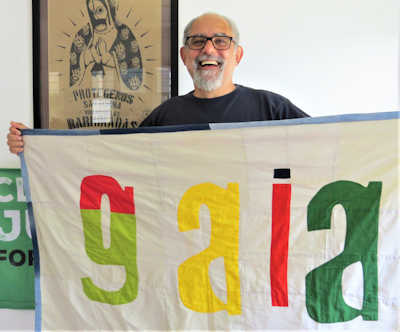 08 December 2020 - 20 years ago, this month, a group of fiercely dedicated activists from across the globe had a vision: to create a cross-regional, grassroots network to stop the threat of incineration and build a just, zero waste future, and so the Global Anti Incineration Alliance (GAIA) was formed.
08 December 2020 - 20 years ago, this month, a group of fiercely dedicated activists from across the globe had a vision: to create a cross-regional, grassroots network to stop the threat of incineration and build a just, zero waste future, and so the Global Anti Incineration Alliance (GAIA) was formed.
GAIA is a worldwide alliance of more than 800 grassroots groups, non-governmental organizations, and individuals in over 90 countries. GAIA states that:
With our work we aim to catalyze a global shift towards environmental justice by strengthening grassroots social movements that advance solutions to waste and pollution.
We envision a just, zero waste world built on respect for ecological limits and community rights, where people are free from the burden of toxic pollution, and resources are sustainably conserved, not burned or dumped.
Read Director of groundWork, Bobby Peek’s, reflections on his journey with GAIA here.
Another milestone as criminal charges proceed against coal polluter Eskom
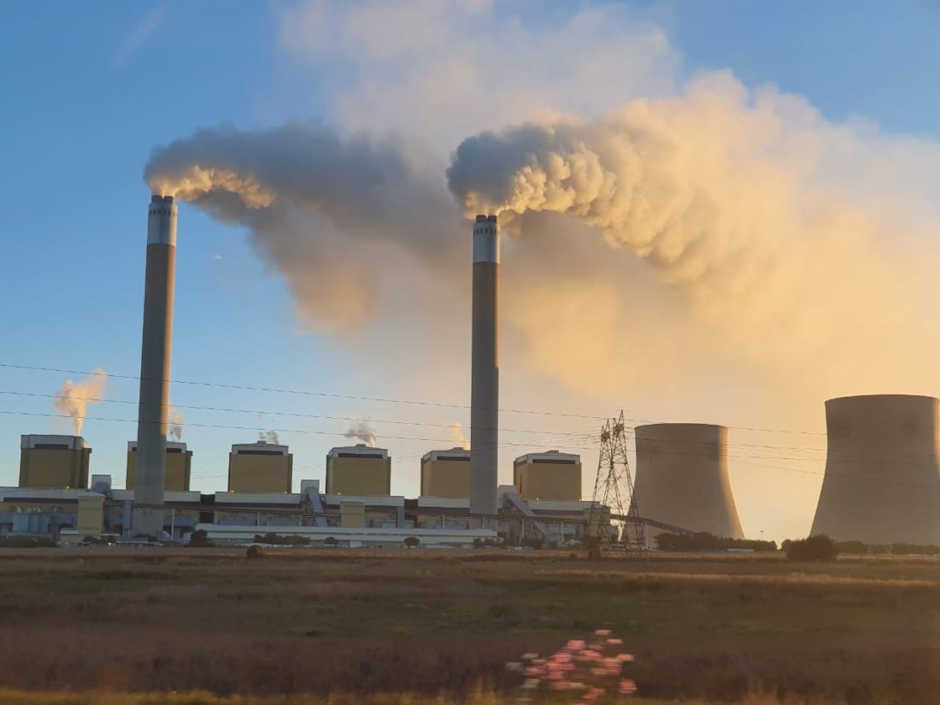
Toxic pollution pumping unabated from the stacks at Eskom's Kendal Coal Power Station, April 2019. Photo: CER.
07 December 2020 - Last week, the Department of Environment, Forestry & Fisheries (DEFF) confirmed that the National Prosecuting Authority has resolved to proceed with the criminal prosecution of major polluter and state-owned entity Eskom, for criminal violations of air pollution laws at its Kendal coal power station.
Kendal power station is situated in the heavily polluted Mpumalanga Highveld, 40km west of Emalahleni. It was built in 1982 with installed capacity of 4 116 MW, and is the largest indirect dry-cooled power station in the world.
According to media reports, the four criminal charges relate to violations of the air emissions permit limits for Kendal, for significant pollution of the environment, and for supplying false and/or misleading information to authorities.
Massive Explosion at Engen Oil Refinery in Durban
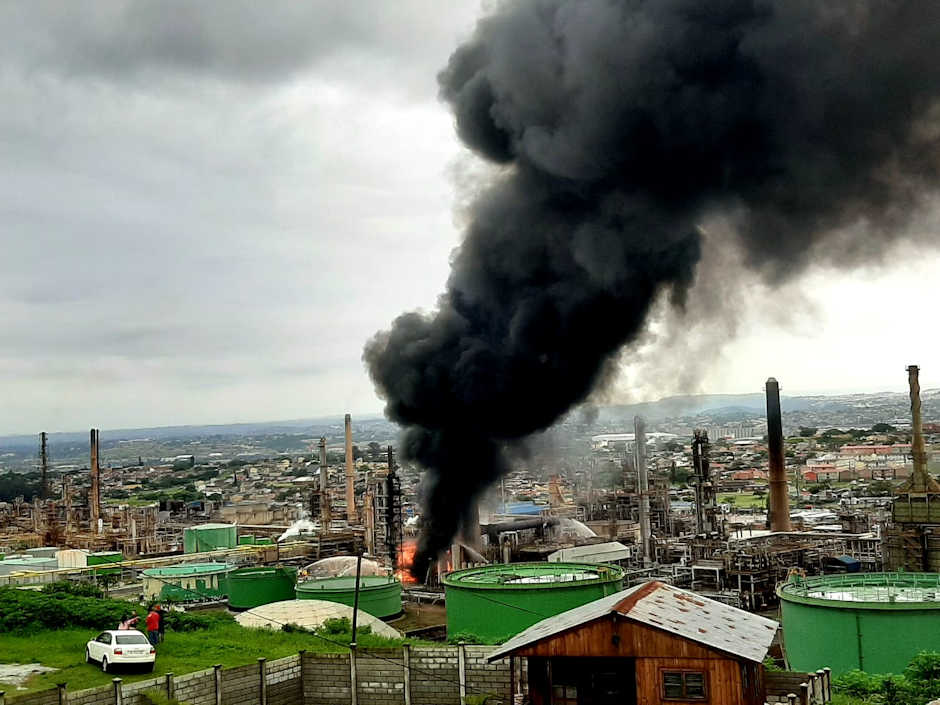
04 December 2020 - An explosion occured at the Engen oil refinery in south Durban this morning. Emergency services are currently on the scene trying to defuse the flames. The cause of the explosion is still not clear. The community around the area are still in shock and those who work at the refinery could not go to work.
 groundWork and SDCEA (South Durban Community Environmental Alliance) have previously called for the refinery to shut down. Coincidentally, the explosion occurs while PASA (Petroleum Agency of South Africa) is in Durban to visit the Merebank community on a number of issues. The Petroleum Agency of South Africa (PASA) plans to be at the Merebank community Hall at 10am in a follow-up meeting in relation to fossil fuels exploration. One of the key concerns communities face is the lack of transparency in public access to documents such impact on people’s health and safety, including emergency, disaster, and contingency plans. Where liablity rests for incidents, accidents and explosions that impact on people and the environment, is a further area of concern.
groundWork and SDCEA (South Durban Community Environmental Alliance) have previously called for the refinery to shut down. Coincidentally, the explosion occurs while PASA (Petroleum Agency of South Africa) is in Durban to visit the Merebank community on a number of issues. The Petroleum Agency of South Africa (PASA) plans to be at the Merebank community Hall at 10am in a follow-up meeting in relation to fossil fuels exploration. One of the key concerns communities face is the lack of transparency in public access to documents such impact on people’s health and safety, including emergency, disaster, and contingency plans. Where liablity rests for incidents, accidents and explosions that impact on people and the environment, is a further area of concern.
Voice Notes Attached: Bobby Peek (groundWork) speaks from south Durban where the explosion occurred:
Voice note 1
Voice note 2.
Contacts:
Tsepang Molefe
+27 74 405 1257
media@groundwork.org.za
Avena Jacklin
+27 82 456 8886
avena@groundwork.org.za
Remembering the Heroes
 03 December 2020 - Today marks the start of a project to record our memory of, and gratitude towards, those heroes who have perished in the struggle for environmental justice - Mam'Fikile Ntshangase, Bazooka Radeba and Berta Caceres amongst others. Over the next few weeks we aim to establish a permanent record of their contribution to the struggle on the Remembering the Heroes page of this website.
03 December 2020 - Today marks the start of a project to record our memory of, and gratitude towards, those heroes who have perished in the struggle for environmental justice - Mam'Fikile Ntshangase, Bazooka Radeba and Berta Caceres amongst others. Over the next few weeks we aim to establish a permanent record of their contribution to the struggle on the Remembering the Heroes page of this website.
MaFikile today is with the ancestors, not only from this area, but with the many who have died because they have tried to defend their land, livelihoods and their environments. Global Witness, an organisation which monitors Human Rights, Land and Environmental defenders globally, gives us the sad hard evidence that MaFikile was not alone. In July they released their Annual Report, which stated that in 2019, 212 people were murdered globally for peacefully defending their homes and standing up to the destruction of nature.
This is four people every week.
Celebrating a major climate victory: Court sets aside approval for Thabametsi coal power plant
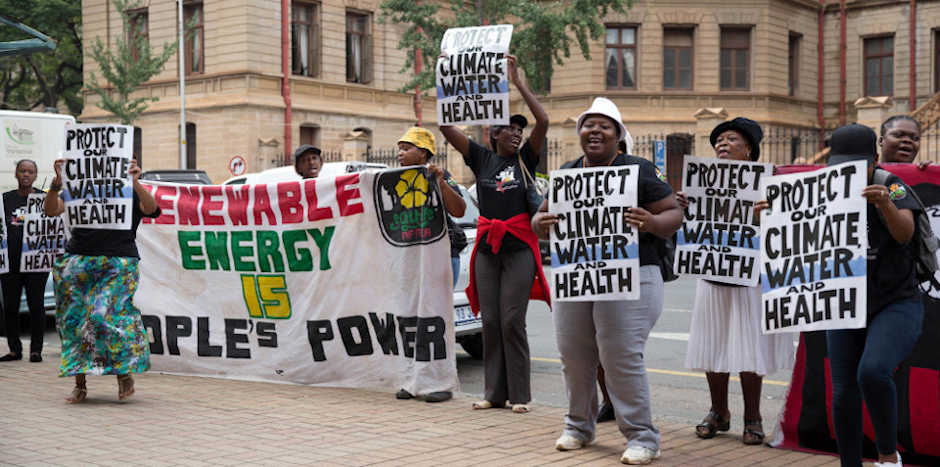
March 2, 2017. Activists from Earthlife Africa demonstrating outside the Pretoria High Court at the start of the hearing of South Africa's first climate change lawsuit. Picture: JAMES OATWAY for CER.
01 December 2020 - Last week, the High Court in Pretoria set aside the environmental approval for the 1200 MW Thabametsi coal-fired power station that would have been built in its first phase at 557 MW outside Lephalale in Limpopo province.
The court order was the result of the settlement of a court application brought by environmental justice groups Earthlife Africa and groundWork, Friends of the Earth, South Africa against the development company Thabametsi (Pty) Ltd and the state, asking the court to set aside the environmental approval for the plant.
“Thabametsi would have been a climate and environmental disaster that would have cost our country R12.57 billion compared to a least cost electricity system,” says Makoma Lekalakala, director of Earthlife Africa.
In 2015, the year in which South Africa ratified the Paris Climate Agreement, as many as 13 private coal power plants were being planned under the 1000 MW coal-baseload independent power producer procurement programme. In 2016, two coal power plants, Thabametsi and Khanyisa, were announced as preferred bidders under the first bid window of this programme.
Thabametsi was backed by South Korea’s KEPCO and Japan’s Marubeni. Marubeni had stepped in as lead project developer after French company Engie withdrew its stake, under pressure from environmental justice groups, in 2015. Khanyisa, planned for Mpumalanga, is backed by Saudi company ACWA Power.

HEALTH CARE CLIMATE CHALLENGE - Global Green and Healthy Hospital 2020 Climate Champions Award
01 December 2020 – Over 300 participants, representing the interest of more than 22,000 hospitals and health centers in 34 countries will be celebrating the Health Care Climate Challenge Awards 20201. The importance of this award is to recognize the efforts that health sector leaders are making towards reducing their healthcare carbon footprint and to encourage other health institutions to follow suit.
Climate Change continues to be an existential threat with the Lancet describing climate change as a global health emergency that threatens to reverse 50 years of health gains in the developing world. WHO Director-General Margaret Chan called climate change “one of the greatest challenges of our time.”
This year, three Health institutions in the Africa region who are also members of the Global Green and Healthy Hospital (GGHH) network were recognized. They include the Mohammed VI University Hospital from Morocco, Western Cape Government Health, and Netcare Limited from South Africa. Their commitments, investments, and innovations are inspiring and guiding the sector around the world, particularly at this very moment when the current COVID-19 pandemic has increased the pressure on the health care sector.
More tough questions for climate rogue Sasol at its AGM on Friday

September 24, 2016. Secunda. Coal mining and powers stations in Mpumalanga. Picture: JAMES OATWAY for CER
20 November 2020 - On Friday, 20 November 2020, activists and lawyers from the Life After Coal campaign will participate in the virtual Annual General Meeting of Sasol Limited. They will be joining community and civil society organisations and activists from South Africa and Mozambique, all of whom have acquired shares in Sasol and therefore attend as shareholders, to ask pertinent questions of Sasol's board and management.
The Life After Coal campaign consists of environmental justice groups groundWork and Earthlife Africa and law centre the Centre for Environmental Rights.
Sasol is South Africa's second highest emitter of greenhouse gases,and its Synfuels plant in Secunda is reportedly the largest single-source point of emissions on the planet. Sasol is listed as one of the so-called Carbon Majors, the 100 companies estimated to be responsible for 71% of global greenhouse gas emissions.
Sasol's mega-facilities in Sasolburg and Secunda have been causing significant pollution impacts affecting communities living in Secunda, Zamdela and surrounds for decades. A recent expert modelling report found that air pollution from Sasol's Secunda Synfuels plant alone is responsible for at least 33 additional deaths per year. Accordingly, between 2020 and 2025, at least 160 people may die from illnesses attributed to Sasol's air pollution in Secunda.
Landmark “Deadly Air” pollution case against government to be heard in May 2021

Photo: Daylin Paul
16 November 2020 - Every day, people living and working on the Mpumalanga Highveld are breathing toxic, polluted air that is harmful to their health and well-being. This is the basis of the Deadly Air case, which will be heard by the North Gauteng High Court in Pretoria on 17 to 19 May 2021.
The applicants in the court case, environmental justice groups groundWork and the Vukani Environmental Movement, launched this Constitutional litigation in June 2019, requesting the court to declare that the poor ambient air quality in the Highveld Priority Area constitutes a violation of the Constitutional right to an environment not harmful to health or well-being. They are also asking the court to order the government to take further steps to improve the air quality in the area. The applicants are represented by the Centre for Environmental Rights.
The United Nations Special Rapporteur on Human Rights and the Environment, Prof David Boyd, was admitted as an amicus curiae (friend of the court) in the case by the Pretoria High Court on 5 November 2020. Professor Boyd is represented by Lawyers for Human Rights. Submissions will be made to the court on his behalf during the hearing.
Major climate impacts scupper another coal power plant

Activists from Earthlife Africa demonstrate outside the court during the hearing of the first Thabametsi coal-fired power station court case in March 2017. Image: James Oatway for CER
11 November 2020 - Major climate impacts and exorbitant costs have sounded the death knell for one of the last new proposed coal-fired power stations in South Africa: Thabametsi in water-scarce Limpopo.
Last week, environmental justice groups Earthlife Africa and groundWork, who have been challenging the Thabametsi power station in court since 2016, secured agreement from both Thabametsi and the state for the environmental authorisation issued for this power plant by the Department of Environment in February 2015 to be set aside. Earthlife and groundWork argued in court papers that former Environment Minister Molewa had disregarded the devastating climate impacts of the 557MW Thabametsi project (originally approved for a capacity of 1200MW).
The setting aside of Thabametsi’s environmental authorisation means that, should it still plan to proceed, it would have to seek a new authorisation from the Environment Department – a major setback for the project.
Case against Tendele Coal in the Supreme Court of Appeal
02 November 2020 - On Tuesday, 3 November 2020 at 9:45, the Supreme Court of Appeal in Bloemfontein will hear the appeal by the Global Environmental Trust and others against a 2018 judgement of the Pietermaritzburg High Court, in which that court had refused to grant an interdict application brought by the Applicants against Tendele Coal Mining (Pty) Ltd and had ordered public interest litigants to pay the legal costs of the coal mining company.
The court hearing is of particular significance because of the shocking murder of 65 year old Fikile Ntshangase at her home in Somkhele, KwaZulu-Natal on Thursday, 22 October 2020. Mam Ntshangase was a member of the Mfolozi Community Environmental Justice Organisation (MCEJO), one of the applicants in the appeal, and a vocal activist against the expansion of the anthracite mine near the border of the Hluhluwe-Imfolozi Game Reserve.
Read the full Centre for Environmental Rights (CER) media release here.
Justiça Ambiental in Mozambique, Friends of the Earth International and CETIM (Centre Europe – Tiers Monde), call for the strengthening of International monitoring and enforcement mechanisms to protect the rights of individuals against the actions of Trans-National Corporations (TNCs)
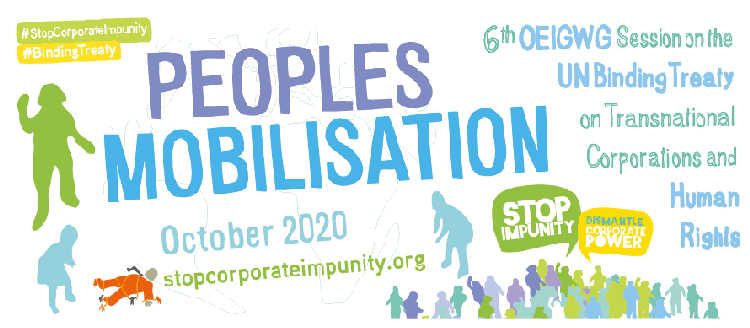
29 October 2020 - Justiça Ambiental in Mozambique, representing also Friends of the Earth International and CETIM (Centre Europe – Tiers Monde) today delivered a short statement during the 6th session of negotiations on a UN Legally Binding Instrument on Transnational Corporations and Human Rights. The statement focuses on the proposed Article 15 of the instrument dealing with International Monitoring and Enforcement mechanisms.
Statement and expression of condolence by groundWork - Friends of the Earth South Africa Director, Bobby Peek, at the memorial service of MaFikile Ntshagase at Somkhele, KwaZulu- Natal, South Africa on 29 October 2020
Lea la versión en español aquí.
groundWork calls for a speedy and urgent investigation to arrest and put on trial those who are responsible for the murder of Mama Fikile Ntshangase
28 October 2020 - groundWork has today sent a letter to the President of the Republic and the Minister of Police calling for a speedy and urgent investigation to arrest and put on trial those who are responsible for the murder of Mama Fikile Ntshangase on 22 October.
In the letter groundWork points out that:
"It is critical that the Minister is seen to be acting for the safety and in the interest of the community, as people currently are living in fear. In April 2019, a coalition of NGOs, including groundWork, working with Human Rights Watch, released a report on the Environment of Fear in South Africa's Mining-Affected Communities, calling on all National Government Agencies, including the Office of the President, to "ensure that law enforcement authorities impartially, promptly, and thoroughly investigate any allegations or incidents of attacks, threats and harassment against community rights defenders and the wider community, for exercise of their rights to freedom of expression, assembly and protest, and adopt a plan that would address the failure to adequately investigate such cases".
Just prior to this report, in August 2018, the South African Human Rights Commission released a scathing report, titled "National Hearing on the Underlying Socio-economic Challenges of Mining-affected Communities in South Africa, stating that the government is responsible for the harm done to mining-affected communities because of its "failure to monitor compliance, poor enforcement, and a severe lack of coordination'. This report also focused on the Somkhele area."
Murder of Somkhele Environmental Activist Fikile Ntshangase

Murdered activist, Mama Fikile Ntshangase
23 October 2020 - “I refused to sign. I cannot sell out my people. And if need be, I will die for my people.” Tragically, grandmother Fikile Ntshangase’s words became a reality when she was gunned down in her home at Ophondweni, near Mtubatuba, on the evening of 22 October 2020.
Mama Nsthangashe was the Vice-Chairperson of a sub-committee of the Mfolozi Community Environmental Justice Organisation (“MCEJO”). MCEJO has been challenging the further expansion of a large coal mine at Somkele in KwaZulu-Natal by Tendele Coal Mining (Pty) Ltd. One of the court cases brought by MCEJO is scheduled for hearing in the Supreme Court of Appeal on 3 November 2020.
On Thursday, 22 October 2020 at about 18:30, four gunmen arrived at Mam Ntshangase’s house, where she lives with her 11-year old grandson. Current reports say that they forced themselves into the home and shot her 5 times, and that she died on the scene.
Tendele’s coal mining operations have caused untold destruction of the environment and the homes and livelihoods of the residents of Somkhele.
New anti-SLAPP website launched by Asina Loyiko campaign
21 October 2020 - On 20 October 2020, the Asina Loyiko campaign launched its new website to serve as a resource and connection hub for activists confronted by SLAPP suits (strategic litigation against public participation) and other uses of the law to discourage and silence activism and free speech.
The collaborative Asina Loyiko: United Against Corporate Bullying* campaign, launched in 2019, is a movement of lawyers, activists and civil society organisations who have come together to fight and resist corporate bullying. The campaign brings together a broad range of diverse civil society actors concerned about the use of the law for corporate bullying, and empowering and supporting activists to resist intimidation and to continue to challenge corporations who violate human rights, social and environmental justice.
Since its launch, the Asina Loyiko campaign has connected local and international actors who are defending legal action and threats, and those developing anti-SLAPP* strategies. Over time, it become evident that a local resource hub would be crucial to the success and amplification of the objectives of the campaign.
Read the full Centre for Environmental Rights media release here.
We Told You So!!! - Civil Society calls on World Bank to stop funding the violation of environmental and Human Rights
19 October 2020 - Eskom’s catastrophic Medupi coal-fired project was in trouble from the start. The World Bank came to Eskom’s rescue in 2010 with a massive loan that would foster the project. It was envisaged that the funding would bring financial stability to Eskom, support future economic growth, contribute to poverty alleviation, and help South Africa onto a ‘low carbon path’. This has not happened.
groundWork, Earthlife Africa and more than 200 supporting organisations warned the World Bank that it would fail on all counts. Medupi would destabilise Eskom and the country’s economy, exacerbate poverty and add 30 million tonnes of carbon to South Africa’s annual emissions – in addition to other harmful air pollution impacts. And so it has.
Electricity tariffs have escalated making it near impossible for people to afford electricity. The inequality gap has widened, Eskom is teetering on the edge of collapse and is dragging the South African economy down with it. The debt costs have skyrocketed and are now burdening South Africans with a dollar-based debt, while many cannot afford the high price of energy.
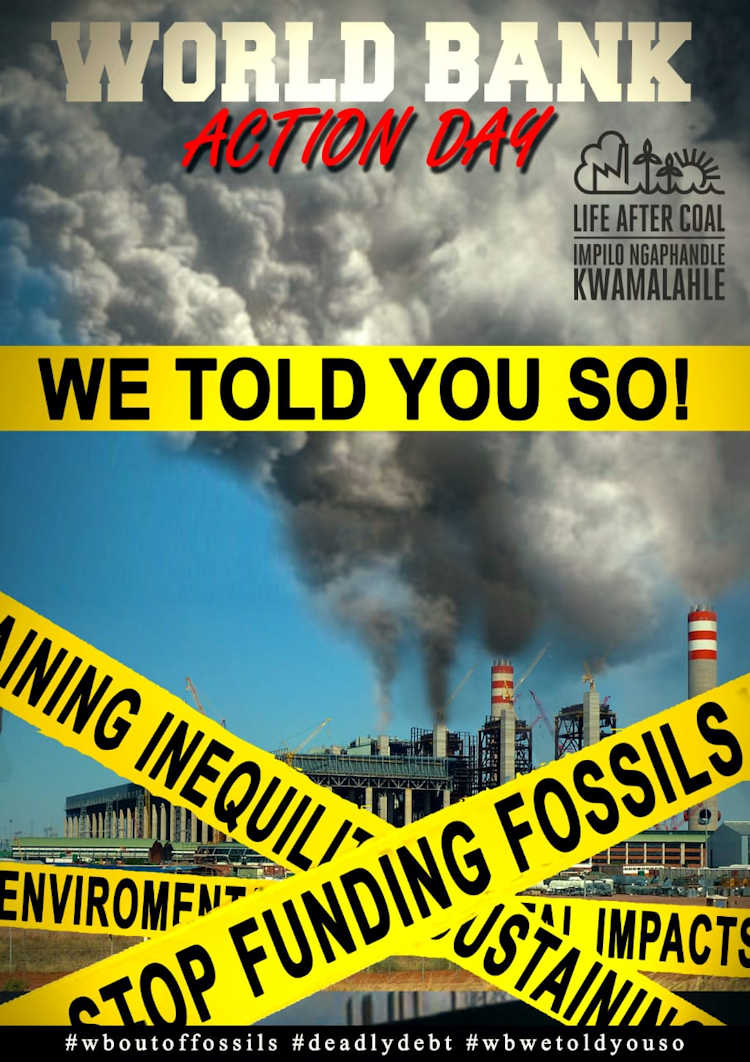
World Bank Action Day
16 October 2020 - Public health professionals from around the world have classified coal as a lethal product, calling for divestment from coal and other fossil fuel industries. Yet the World Bank continues to fund the “killer fumes” from Eskom’s Medupi coal-fired power station.
Further information:
- International Health Group calls for ban on coal - urges action by governments and institutions.
- Medupi's killer fumes - the story of a power station's missing air-scrubbers.
#deadly debt; #odious debt; #wb out of fossil fuels
Law, people, planet, justice: CER turns 10!
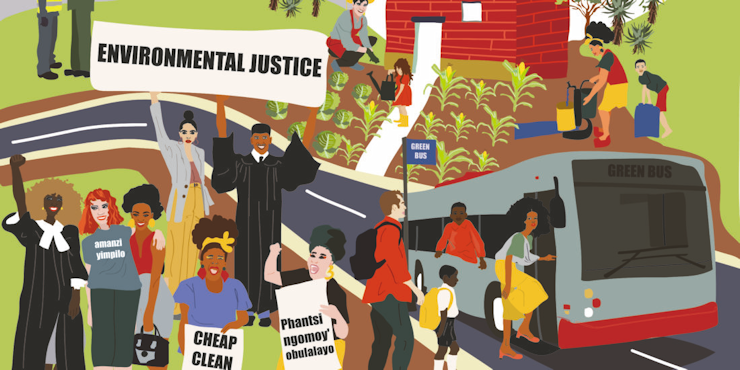
Illustration: Phathu Nembilwi for CER
06 OCTOBER 2020 - This week, the Centre for Environmental Rights honours a decade of litigation, advocacy and activism for environmental justice: it has been 10 years since CER opened its doors in 2010.
Where it all started
In the late 2000s, although section 24 of the South African Constitution guaranteed the right to a healthy environment, the concept of “environmental rights” was still relatively new in South Africa. Implementation of the environmental laws promulgated to give effect to that right was slow, and compliance and enforcement hampered by flawed tools, and limited resources. The lack of transparency and accountability from corporate and state actors in respect of environmental governance was of great concern. The horrific environmental and social legacy of our mining industry was evident, yet new mining and production rights were being granted at pace, without regard for that legacy, and in places that our government had itself identified as being of biodiversity or hydrological sensitivity and importance. Moreover, mining-affected communities were already suffering the consequences of mining rights being granted without adequate community consultation or benefit-sharing, and seeing the destruction of their livelihoods and heritage.
It was in this context that the idea of a legal organisation to support the non-profit environmental sector in South Africa took root. A year of intensive consultation with NGOs and community organisations across South Africa grew into the formal establishment of the Centre for Environmental Rights in October 2009.
In April 2010, with only a handful of staff, working with existing NGOs and community organisations, the new Centre set out to shift these trends using the law. While building a legal case for the declaration of no-go areas for mining, we challenged new mines being proposed, or already underway, in sensitive areas; we started collecting and publishing evidence of disclosure of impacts and compliance by companies, and tracking the results of compliance monitoring and enforcement by government.
Rhino Oil and Gas at it again!
30 September 2020 - After losing the anti-fracking fight last year to farmers in KwaZulu Natal, Rhino Oil and Gas South Africa (Pty) Ltd have appointed environmental consultancy SLR yet again to apply for a new Exploration Right (350 ER) in the Free State and KwaZulu Natal provinces. This covers an area extending from the Upper Tugela region to Warden and includes 4370 farms in Harrismith, Kestell, Bethlehem, Reitz and Lindley (shown below) and which can also be viewed on the groundWork battlemap.

The sole purpose of holding an Exploration Right is to identify viable petroleum resource areas with the intention to extract which will include extraction methods such as fracking and drilling. Rhino wants to explore for oil, gas, condensate, coal bed methane, helium situated in areas within our water factories or strategic water source areas.
Mining licence for Namibia’s sensitive Kavango region goes underground
28 September 2020 - In a media release on 18 September 2020, the Namibian Ministry of Mines and Energy stated: “To date no onshore production licence for PL073 has been applied for/or granted and no licence for the development of unconventional resources (e.g. Shale Gas) has been applied for/granted in Namibia.”
This seems to be disputed by ReconAfrica on their website. According to them their exploration licence “ entitles ReconAfrica to obtain a 25-year production licence”.
The Namibian mining ministry stated that “the proposed activities will not in any way cause negative impacts to the Okavango Ecosystem” and that “all the necessary environmental impact permits for the project are in place”.
To date, only one-third of the Environmental Impact Assessment has been delivered to the Namibian and civil society members including Avena Jacklin, the Climate and Energy Justice campaign manager for the Southern African-based environmental justice group groundWork.
She says that “it is shocking that this EIA was authorised at all”.
According to Jacklin, the area that ReconAfrica says it will drill “is part of a critical water network supporting the ecosystems spanning Namibia, Angola and Botswana. Furthermore, documentation on the IAPs (Interested and Affected Parties) and their consultation was missing from the EIA”.
Durban's climate plan is drowning in politics with targets far from being reached
27 September 2020 - The Durban Climate Action Plan (CAP) released earlier in September forms part of a drive by 96 cities across the world to address climate change under the banner of the C40 Cities Network, whose goals are linked to the 2015 Paris Climate Agreement.
But Desmond D'Sa, founder of the globally recognised South Durban Community Environmental Alliance (SDCEA), told Daily Maverick eThekwini was "not serious about protecting the environment" as "no major polluter has been fined or prosecuted".
"The city ignored the recommendations of its own health study completed in 2007. This study recommended that all polluters must characterise all chemicals that fenceline communities are exposed to," explained D'Sa
The C40 cities aim to help reduce average temperature increase by 1.5 degrees Celsius over the next 30 years.

Beyond COVID-19: Toward healthy people, a healthy planet, justice, and equity - A statement by the Health Care Without Harm Global Network
18 September 2020 - As the world responds to COVID-19 and the intertwined social, political, and economic crises it has spawned, we find ourselves at a crossroads. One path takes us back in the direction we came, propping up old structures and systems that have led to this crisis in the first place. The other leads in the direction of an unprecedented set of opportunities and the urgent need to forge a just transition to equitable, resilient societies that provide decent work for all, universal health care, and contribute to a healthy climate.
For our civilization to survive and thrive, we must choose this second path and change systems that place profit over ecological sustainability, health, and wellbeing. We must build structures that benefit all people, especially the vulnerable and the poor. As part of this effort, we must recognize and address the political, social, and economic factors that govern how health or illnesses move through our communities. As many around the world rise up against systemic racism and discrimination, we must also forge a broad, interconnected agenda for change that fosters health equity, ecological sustainability, and social justice.
As part of this vision, the Health Care Without Harm network (HCWH) - our offices and partner organizations around the world - supports the WHO Manifesto for a Healthy Recovery and its prescriptions for a healthy, green recovery from the COVID-19 pandemic. We believe it is essential to build a global movement for health and environment that contributes to, and becomes part of, the broader social movements for structural change necessary at this critical juncture. We see many hopeful signs of this movement emerging all around the world, taking initiative to forge positive social and environmental change locally, nationally, and globally. This statement is, in many ways, a reflection of that emergent movement, the key issues we believe it must tackle, and the fundamental actions it is already beginning to support.
Changing Markets Foundation releases new report exposing the corporate playbook of false solutions to the plastic crisis
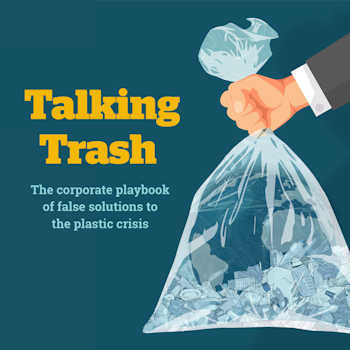
17 September 2020 - In the face of the ever-pressing plastic pollution crisis, the plastics industry has continuously pledged their commitment to address this probing problem through voluntary efforts.
However, a new report by the Changing Markets Foundation reveals that these nice sounding promises to address this crisis are a form of distraction to delay and derail legislative solutions to the plastic catastrophe, creating a tidal wave of plastic pollution around the world. Based on research and investigations in over 15 countries across five continents, Talking Trash: The Corporate Playbook of False Solutions exposes how tactics to undermine legislation in individual countries are in fact part of a global approach by Big Plastic to ensure that the corporations most responsible for the plastic crisis evade true accountability for their pollution.
groundWork joins CER call on government to heed public health professionals’ call for climate leadership
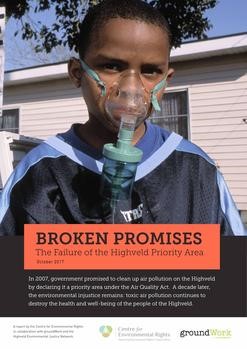 16 September 2020 - A group of prominent South African public health experts and practitioners has written to Finance Minister Tito Mboweni calling for stronger leadership from the South African government on climate, energy and health in building a post-COVID-19 South Africa.
16 September 2020 - A group of prominent South African public health experts and practitioners has written to Finance Minister Tito Mboweni calling for stronger leadership from the South African government on climate, energy and health in building a post-COVID-19 South Africa.
In a letter to Minister Mboweni on 14 September 2020, the Climate, Energy and Health Special Interest Group of the Public Health Association of South Africa (PHASA) writes that it is necessary to act now to combat climate change and build a new, resilient economy. The Special Interest Group has appealed to Minister Mboweni to lead his fellow Cabinet members toward securing ecologically sustainable development in South Africa. “People’s health is the bottom line of climate change,” writes the group.
Minister Mboweni is representing South Africa at a G20 health and finance ministers meeting on 17 September 2020, focused on planning for future pandemics.
The PHASA Special Interest Group has urged Minister Mboweni to “ensure that these plans include investments in health systems, that they are inclusive, and that they fully integrate environmental sustainability and effective climate responses for the health of present and future generations”.
Prize Winners Today: Environmental Justice with Bobby Peek
15 September 2020 -
“A march is not a movement.”
“It’s just a point in time when people come together. Movements are everyday lived realities and processes. They are about change over time and not change through one moment.”
Equating the development of a social movement to a tree’s strengthening roots (slow, sustained, and motivated) and its marches and rallies to the tree’s flowers (vibrant, colorful, and expressive), Bobby Peek’s interpretation of today’s social upheaval reveals his foundational understanding of a long history of environmental injustice in South Africa. Needless to say, our team was eager to speak with Bobby as part of the Prize Winners Today series.
Since winning the Goldman Environmental Prize at the young age of 30, social activist and environmental champion Sven “Bobby” Peek (South Africa, 1998) has maintained an energetic drumbeat of community organizing. Over two decades later, he finds himself and his NGO, Groundwork, uniquely positioned to meet today’s global moment of social and environmental awareness.
You can read the full article by Goldman's Ellen Lomonico here.
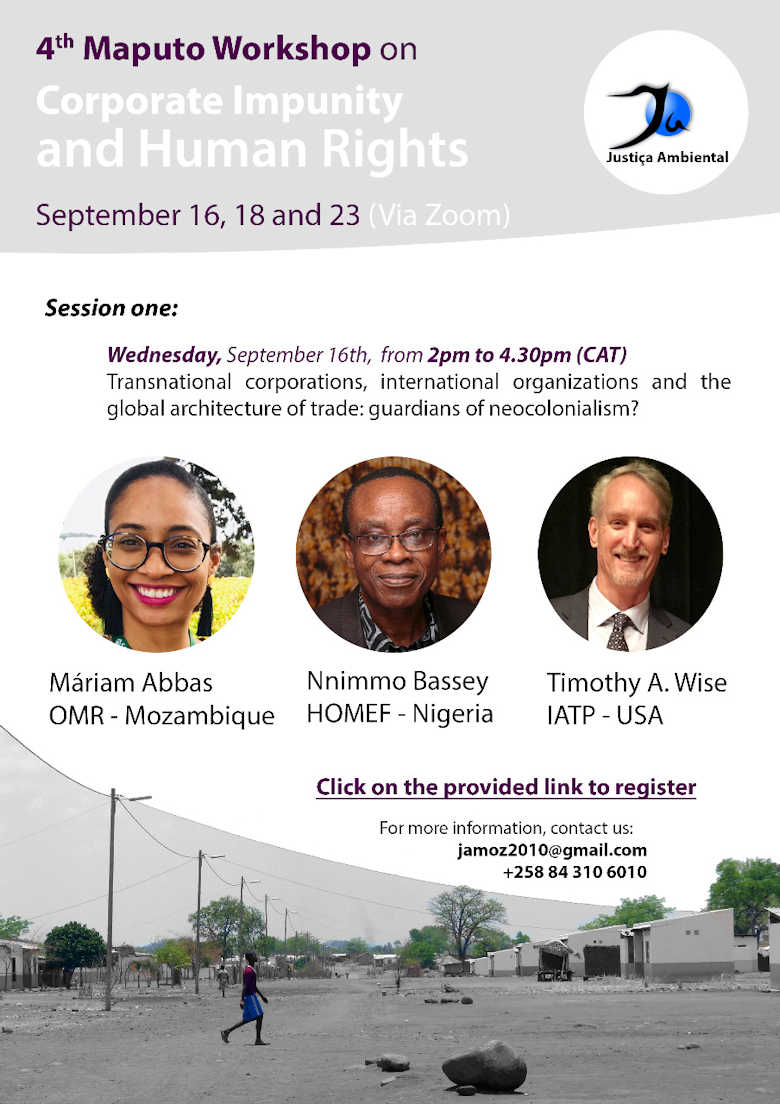
Big corporations have become incredibly powerful in recent decades in the face of the expansion of neo-liberal capitalism and the advent of globalisation. Even more powerful than most States in the Global South, in addition to forcing governments to relax their environmental and labour laws, corporations have contributed to the privatisation of democracy, influenced social and economic policies to suit their interests, and developed an international trade architecture that grants them unprecedented rights without being properly regulated. Why is it important for Mozambique to understand the structural causes behind the impunity of transnational corporations, and the neocolonialist dynamics of this phenomenon? How is this reflected in our context? Which alternatives and resistance are being crafted - here and across the world - in this respect? How should international human rights legislation evolve in this regard?
Join us for a series of 3 virtual conversations with lawyers, experts and activists from Mozambique, Cameroon, Kenya, Nigeria, Brazil and the USA, during the 4th Maputo Workshop on Corporate Impunity and Human Rights.
1st session - Wednesday September 16th, 2pm to 4.30pm (CAT)
Transnational corporations, the world bank and the global trade architecture: guardians of neocolonialism?
Nnimmo Bassey (HOMEF – Nigeria)
Mariam Abbas (OMR – Mozambique)
Timothy A. Wise (IATP – USA)
Register here: https://zoom.us/webinar/register/WN_ND7NOaKrTR6DzddLRUILGQ
More information: jamoz2010@gmail.com // +258 84 3106010
Minister Revokes Karpowership NEMA Section 30 Directive
08 September 2020 - Sonnyboy Bapela, Chief Directorate of Compliance at the Department of Environment Fisheries and Forestry (DEFF) issued a verbal directive in terms of Section 30 (A) (1) of the National Environmental Act, 1998 (NEMA) on 26th June 2020 – authorizing Karpowership SA Pty Ltd to generate power in excess of 50MW from floating gas ships. These were to be located within the ports of Ngqura, Richards Bay, Saldanha Bay and Durban including the installation of 132KV steel towers and gas pipeline infrastructure along the seabed. On 16th July the written Directive was signed off by the Environmental Assessment Practitioner (EAP), Hanti Plomp, of Triplo4SustainableSolutions, and not DEFF.
This was wrong for many reasons. Firstly, Section 30 (A) 1 does not authorize new generation capacity in the particular circumstances. It only allows for specific activities to prevent an emergency situation such as a discharge of excess water to prevent a dam burst. This implies that there must be a degree of urgency. The long construction times and need to obtain necessary licenses and permits cannot provide instantaneous relief for emergencies.
groundWork Submits Comment on DEFF’s Notices to Fast Track Environmental Assessment Processes
08 September 2020 - In response to a Public Notice calling organisations to engage with the DEFF, groundWork has prepared detailed comments on various Environmental Management Instruments. Our comments were delivered to the Director-General of the Department of Environment, Forestry and Fisheries (DEFF) on Friday 4th September 2020.
Public participation processes have not reached all the people and communities living in the affected areas. The greatest impact of fossil fuels and their infrstructure is felt by poor and marginalised communities. The proposed increase in gas pipelines, infrastructure and related activities, will result in increased risks and will impact negatively on human health, ecosystems and water resources.
Specialist studies and reports have been excluded from SEA processes. The oil and gas industry, worldwide, already contributes 71% to global greenhouse gas emissions. Gas development in South Africa will increase our greenhouse gas emissions and must not be falsely described as a source of clean fuel. Job creation within the industry has not been properly addressed. The development of gas pipeline infrastructure will not create sustainable jobs. Gas infrastructure will become redundant (and dangerous) in less than 20 years, while the lifespan of solar installations currently is 30 years.
Friends of the Earth Africa and African Climate Justice Groups' Statement on the Oil Spill on the Coast of Mauritius

Partial view of oil spill. Source: Sky News.
24 August 2020 - We, organizations in Friends of the Earth Africa, the African Climate Justice Group, and Friends of the Earth Japan stand in solidarity with the people and Nature of Mauritius. We send our salutes and commend the Mauritian people in their incredible collective efforts, passion and commitment towards containing the spill and its impacts. Nevertheless, we condemn in the strongest possible terms, the oil spill from a Japanese owned ship, MV Wakashio and the demonstrated incompetence of the incumbent authorities in preventing it, and in dealing with the spill's aftermath .
The Japanese owned ship, MV Wakashio, carrying 4,000 metric tons of oil, ran aground just off the coast of the small island nation of Mauritius on July 25, 2020 and broke apart on Saturday August 15, 2020.
Over 1000 metric tons of the oil in the ship has spilled into the surrounding waters and there are concerns that more oil will spill from the ship. This spill is already and will continue to cause substantial damage to the Island's ecosystem and local livelihoods. This without mentioning the expected long-term damage to marine environments expected from the disposal of the shipwreck after it is removed.
Mauritius is a biodiversity hotspot and the spill occurred near two environmentally protected marine ecosystems and the Blue bay marine reserve park which is a wetland of immense international significance. Coral reefs, protected lagoons and the nation's shorelines have already been impacted.
REDZ Decision Making is Everybody's Business
14 August 2020 - The Department of Environment Fisheries and Forestry (DEFF) is attempting to push through and fast track processes around the proposed Renewable Energy Development Zones (REDZ) which includes gas pipeline corridors. The Public Notice was only advertised between 23rd and 31st July, shortening the available time for response by six to fourteen days for those who saw the advertised notices. The Public Notice was advertised in three provinces and only in English. However, the area of impact of the proposed REDZ and corridors extends into all nine provinces. In addition, the links on the adverts did not work, making the information inaccessible for those using popular search engines.

On 4 August 2020 groundWork in a letter to the DEFF Director General, Dr D Fischer, highlighted these and other concerns around the REDZ notification and requested an extension of the processes until all measures are taken for the national public participation required. Particularly under the State of Disaster where provision must be made for alternative and suitable forms of notification. DEFF intends to ‘streamline’ the environmental impact processes. This would enable authorization through shortening or exclusion of environmental assessment timeframes and administration, which may further exclude participation.
Water Tribunal says climate change must be considered in water licence applications for coal power plants

05 August 2020 - A landmark decision by the Water Tribunal confirms that water licensing authorities must consider the impacts of climate change when deciding whether or not to grant water use licences to coal-fired power stations.
In its decision handed down on 21 July 2020, the Tribunal upheld an appeal to set aside the two water use licences granted by the Department of Water Affairs and Sanitation to ACWA Power for the development of a new coal-fired power station, Khanyisa. The Tribunal found that the water use licence applications were procedurally flawed, but also that the licensing authority had not adequately weighed up the impact of climate change on water security in the region.
“This decision means that, when considering a water use licence application for a coal power plant like Khanyisa, the Department of Water and Sanitation must consider the impacts of climate change on water when deciding whether or not the project will amount to the efficient and beneficial use of water in the public interest,” says Michelle Koyama, attorney at the Centre for Environmental Rights. “Prior to this, there was no explicit requirement to include the impacts of climate change when considering factors relevant to the decision to issue licences under the National Water Act.”
No decisions about our energy future without transparency, says groundWork
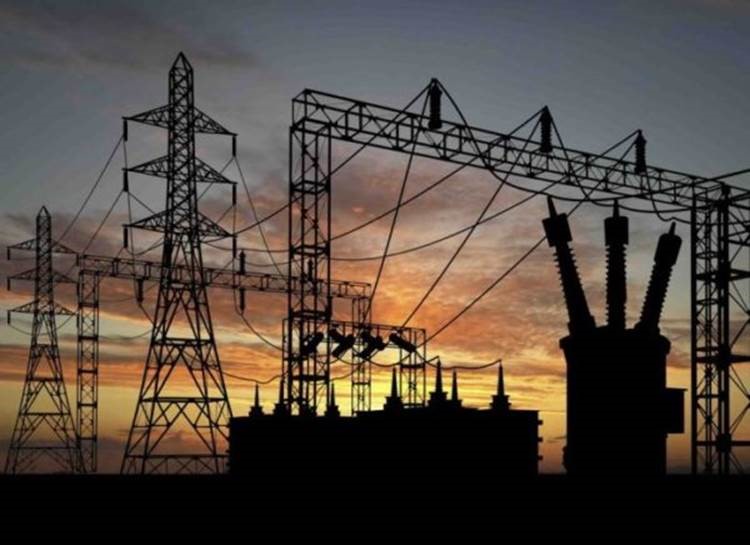
28 July 2020 - Decisions about South Africa’s energy future must be made in a transparent and accountable manner. This is the basis for new court proceedings launched this week by environmental justice group groundWork against the Minister of Mineral Resources and Energy Gwede Mantashe and the National Energy Regulator of South Africa (NERSA).
In its court proceedings, groundWork is asking the North Gauteng High Court to order the Minister and NERSA to provide reasons for various decisions related to the Integrated Resource Plan for Electricity, 2019 (IRP).
groundWork has sought written reasons for the IRP from both the Minister and NERSA – which the Minister and NERSA are legally required to provide – since November 2019. The Minister and NERSA’s failure to provide reasons has forced groundWork to institute litigation to obtain the answers.
Public Participation Put on Mute - Total and SLR Alienate and Snuff out Communities' Voices In Public Participation Process

18 July 2020 - On Thursday 16th July at 16h00 the appointed environmental consultancy SLR hosted what was meant to be a stakeholder engagement webinar session with oil and gas company, TOTAL’s new proposed drill wells in Block 11B/12B. Stakeholder engagements and consultations form part of the requirements of the public participation process for the environmental authorization application and must comply with regulations set out by the Department of Environmental Affairs Fisheries and Forestry (DEFF) and related Covid-19 Directives. Stakeholder engagement is a process of interacting with stakeholders, so that a range of views and concerns can be expressed to inform decision-making and help build consensus on the assessment process to be followed. Such processes have to be open, transparent, equitable and allow sufficient time and meaningful process for interested and affected parties to engage. But the session proved to be nothing more than a one-way transmission.
Prospecting drilling, seismic testing and associated electromagnetic waves will potentially impact Marine Protected Areas including a Critical Biodiversity Area (CBA). CBAs are of particular concern because they are protected areas required to meet biodiversity targets for ecosystems, species and ecological processes. Key biodiversity authorities, institutes, researchers and conservation groups were left out of the public participation plan. Critical parties involved in disaster management planning and response were also not included to address key risks such as a blowout. The uncontrolled release of oil and gas after a system failure could have devastating impacts on people and the environment. Preparation for any incident and accident is lacking in the report as is information related to TOTAL’s Brulpadda failures in the very same waters as the proposed 10 new drills.
It is clear that SLR and Total have plotted dirty tricks to muffle people’s rights to a fair and equitable public participation process in Minister Mantashe’s push for petroleum. As South Africans push through the worst of the Covid-19 pandemic, their rights as citizens continue to be violated. And at a time when everyone should be keeping an eye on rising carbon, global temperatures and climate change impacts.
Undemocratic push for expansion of petroleum oil and gas during lockdown - The virtual walk out!
07 July 2020 - On the 6th May 2020 groundWork together with the South Durban Community Environment al Alliance ( SDCEA), Enviros , Earthlife Africa, Support Centre for Land Change (SCLC), Oceans Not Oil (ONO) and FrackFree SA raised objections to the exclusionary consultative processes of the Draft Upstream Petroleum Bill conducted by the Department of Mineral Resources and Energy (DMRE)'s Planning Committee.
A virtual walkout took place on the grounds that such process leaves behind communities across the country that are complying with lockdown restrictions, many without the privileges of telecommunications proposed by the DMRE for consultation. People's struggle during this time of Covid-19 is a matter of survival to access food and healthcare, particularly for those also living under dire pollution conditions in the Highveld as a result of the fossil fuel industries impacting on their health. They are the ones excluded from this process, as well as many rural, coastal and farming communities throughout South Africa whose lives will be further impacted by this Bill and whose voices need to be heard in the consultation process.
It is critical that whatever consultation happens, reaches the affected people as well.
Plastic Free July
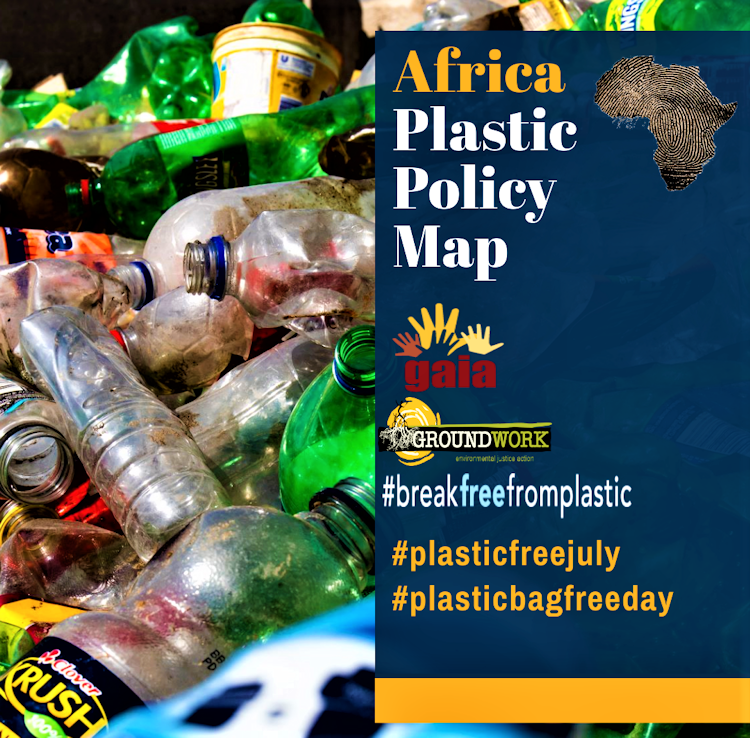
03 July 2020 - Plastic pollution is a major threat to human health and environmental sustainability. Government policies that restrict plastic production is one way we can tackle this issue. Africa has made incredible strides in the fight against plastic, while not all bans on plastic have been effectively enforced, countries like Rwanda and Kenya have championed strong enforcement to justify the reasoning behind placing a ban in the first place. Other African countries have also made significant contributions to stop the production and importation of single use plastic. This Plastic Free July we reflect on the plastic policies that have been issued by African countries.
Hashtags:
#breakfreefromplastic; #plasticfreejuly; #plasticbagfreeday; #africa; #plasticban; #notoplastic; #JustRecovery; #BetterNormal
Shortened Link for Map: bit.ly/AfricaPlasticPolicyMap
Vaal Communities Demand Transparency from Polluter ArcelorMittal at its Shareholder Meeting

30 June 2020 - Africa’s giant steel producer and serial polluter ArcelorMittal South Africa, today holds its AGM (Annual General Meeting) and Environmental justice organisations VEJA (Vaal Environmental Justice Alliance) and the LAC (Life After Coal) coalition will confront AMSA on their environmental transgressions, lack of transparency and community consultation at its Vanderbijlpark operation.
The online action comes only a few weeks after the company was ordered to pay R3.6 million relating to charges of exceeding hydrogen sulphide minimum emissions standards at its coke plant in Vanderbijlpark. The plant was found guilty of exceeding permissible emission levels.
For many years AMSA has refused to disclose environmental plans to reduce their pollution to communities until 2014, when the Centre for Environmental Rights, acting on behalf of VEJA took successful legal action and the Supreme Court of Appeal forced ArcelorMittal to release the information. Despite the court’s damning ruling – and AMSA’s undertakings to be more open and transparent going forward, AMSA’s environmental information has not been made readily accessible.
Their Vanderbijlpark plant is not an isolated case in their dirty operations. Sereti mine in Newcastle has also faced tough resistance from surrounding communities as a result of water pollution, air pollution, and failure to substantially engage with community members.
TRANSPARENCY COSTS NOTHING - VAAL COMMUNITIES DEMAND SUBSTANTIVE CONSULTATION AND FULL DISCLOSURE FROM AMSA AT 2020 AGM

26 June 2020 - For several years, AMSA has failed to comply with its air emission licence (AEL) conditions. Communities living in the Vaal Triangle Airshed Priority Area (VTAPA) have long suffered the effects and have been vocal about the harmful impact of air and other pollution on their health, wellbeing, as well as the infringement of their constitutional right to a healthy environment. Once again, at the 2020 AGM - on 30 June, community activists demand accountability from Africa's largest steel producer and the third highest contributor of greenhouse gas emissions in South Africa.
Gas Rush, Human Rights Abuses, Climate Devastation, Insurgent Attacks, Covid Hotspot - The Ravaging of Cabo Delgado, Mozambique

25 June 2020 - Cabo Delgado needs our support and solidarity. The gas industry is ravaging the northernmost region of Mozambique, as transnational corporations and elites pillage its resources and devastate communities. Like all extractive industries, gas extraction in Mozambique is fuelling human rights abuses, poverty, corruption, and social injustice. It will have severe consequences for a country already vulnerable to climate change impacts, such as the two catastrophic cyclones in 2019.
Currently the sovereignty of Mozambique depends, not on the peoples of Mozambique, but on investors and other states. With internationalist solidarity we can fight to redress this wrong: Stop companies from signing exploration and concession contracts; stop financiers from investing; stop transnational corporations and countries from the Global North dictating Mozambique’s reliance on fossil fuels; stop local communities from losing their homes, territories, lands and livelihoods. Mozambique’s current development pathway of fossil fuel exploitation is resulting in the loss of communities’ livelihoods, human rights abuses, the destruction of the environment and exacerbation of the climate crisis.
This is why JA! (Justiça Ambiental/ Friends of the Earth Mozambique) and Friends of the Earth International are asking for support from our friends around the world.
Read the full Friends of the Earth International (FOEI) article here.
Holding Polluters Accountable in South Africa
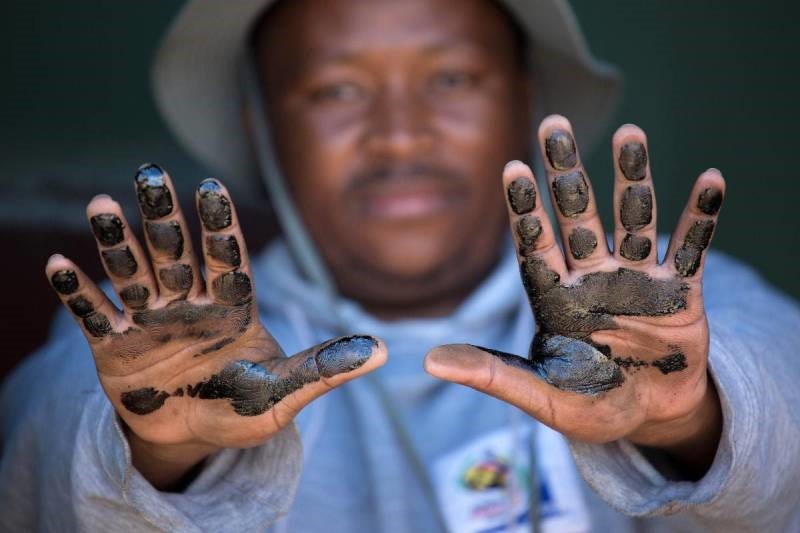
Community activist Samson Mokoena of Vaal Environmental Justice Alliance holds up tar covered hands after touching contaminated groundwater in AMSA’s monitoring borehole. PHOTO: James Oatway for the CER
25 June 2020 - The world’s largest steel producer, ArcelorMittal, was fined this month for violating three atmospheric emission license conditions at its Vanderbijlpark operations, south of Johannesburg.
Attorneys at the Centre for Environmental Rights (CER) have collaborated with ELAW for years to help the community-based Vaal Environmental Justice Alliance (VEJA) hold ArcelorMittal’s Vanderbijlpark facility accountable for polluting practices.
In a recent interview in Business Report, CER attorney Michelle Koyama said:
“High levels of air pollution have devastating impacts on human health and wellbeing. If large industrial companies fail to address their pollution and emissions, they will continue to face litigation and prosecution in accordance with the law. This includes the Deadly Air litigation instituted last year.”
Read more at the Environmental Law Alliance Worldwide's website here.
Standard Bank board: fossil fuel ties brought to light
08 June 2020 - Seven of Standard Bank’s 18 board members are conflicted on climate change-related matters by virtue of their ties to the fossil fuel industry. Fourteen climate justice NGOs from around the world, led by shareholder activist organisation Just Share, have called on Standard Bank’s shareholders to vote against the election / re-election of climate-conflicted directors at the upcoming AGM.
Board members with a conflict of interest are required by the Companies Act, 2008 to declare those interests and to recuse themselves from board meetings during consideration of any matter in relation to which they are conflicted. Such conflicts include not only personal conflicts, but also those with related parties, which include other companies of which the board member is a director.
The election of Standard Bank’s climate-conflicted board members risks entrenching a high tolerance for exposure to the fossil fuel industry for years to come. Climate justice organisations from around the world have therefore decided to shine a light on this issue, and have written to Standard Bank shareholders calling on them to vote against the election of these directors at Standard Bank’s AGM on 26 June.
Life After Coal Campaign's three important submissions on government's latest proposed electricity regulations and plans
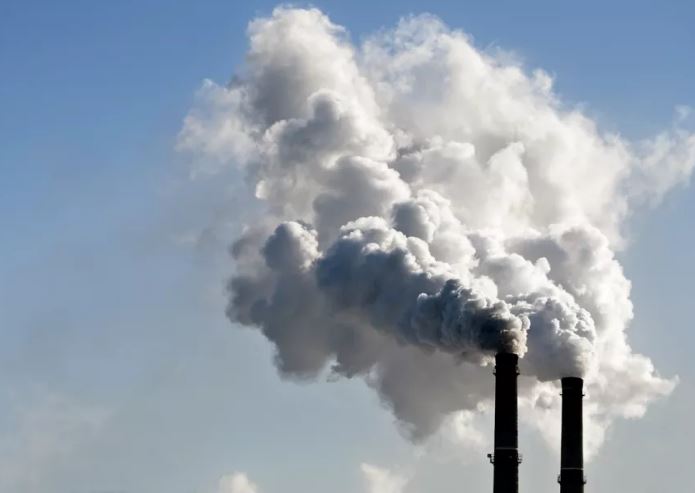
05 June 2020 - In the past months the country has seen some important legislative and administrative proposals for South Africa's electricity system, emerge from the Department of Mineral Resources and Energy (DMRE) and the National Energy Regulator of South Africa (NERSA).
Life After Coal has made submissions which highlight the irrationality and unconstitutionality of any decisions to proceed with the development of new fossil fuel electricity generation capacity.
They emphasise the fundamental role to be played by local government in expediting the transition to clean energy, which is urgently needed. The transition must be just and it must be prioritised by government at all levels.
NGOs reject proposed new gas law, demanding instead a just and equitable transition to clean energy sources
.jpg)
Image by: Michael Raimondo, Louis Duvenage and Suffering is Forever by Green Renaissance
29 May 2020 - The Centre for Environmental Rights (CER), groundWork and Earthlife Africa have slammed the proposed Upstream Petroleum Resources Development Bill, published for comment by Minerals and Energy Minister Mantashe in late December 2019.
By mandating that oil and gas production “must” contribute to the nation’s social and economic development, the government is locking in fossil fuel production for decades to come, when it should urgently be tackling the climate crisis. This means that protecting human health and the environment will once again taken a back seat to unsustainable development.
The NGOs argue that the Bill should not proceed in its current form, if at all. Any new legislation governing petroleum resources extraction must give effect to a just transition away from fossil fuels to clean renewable energy sources, not “accelerate” their production, as the Bill states in its preamble.
Minister Creecy upholds enforcement action against Eskom’s killer Kendal power station
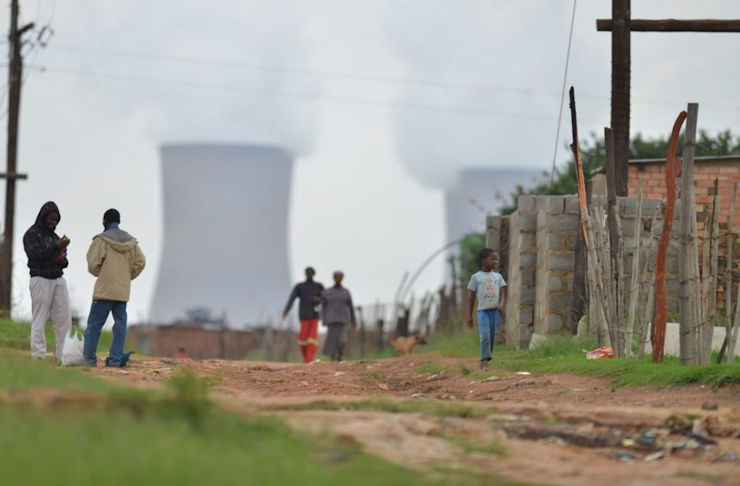
Photo: © Mujahid Safodien-Greenpeace.
18 May 2020 - The Environment Minister, Barbara Creecy, has rejected Eskom’s objection to and confirmed the compliance notice issued to Eskom in December 2019 by the Department of Environment, Forestry and Fisheries (DEFF) to Eskom in relation its troubled Kendal power station.
Minister Creecy has ordered the following, inter alia:
- that, within 30 days of the decision, Eskom must stop operations at either unit 1 or 5 unit until DEFF agrees that its operation may commence. During this period, Eskom must carry out the required maintenance on one unit at a time to ensure compliance with its air emission licence; and
- that within 60 days of the decision, for units 2, 3, 4, and 6, Eskom must submit a plan of action (prepared by a suitable independent expert) outlining measures and timeframes to ensure these units comply with the licence.
In her decision, the Minister states that she is “mindful of the fact that failure to take action to bring [Kendal] back into compliance … will continue to present serious environmental impacts and health threats to the affected communities.”
CER makes a Constitutional case for local government to provide clean electricity
13 May 2020 - The City of Cape Town seeks to develop its own clean electricity capacity without requiring the national Energy Minister’s permission. Legal representatives for the City, the National Energy Regulator of South Africa (NERSA) and the Minister of Mineral Resources and Energy, with the Centre for Environmental Rights (CER) as a friend of the court (amicus curiae), made their submissions before High Court Judge Leonie Windell in a virtual hearing on 11 and 12 May 2020. The hearing was not open to the public, but was recorded.
The Constitutional obligations of local government, in relation to electricity generation, are a central focus of the case.
The CER sought to assist the court in understanding the important role that local governments can and must play in protecting human health and the environment, by facilitating the transition from harmful fossil fuel-based electricity to renewable (solar and wind) electricity. Fossil-fuel based electricity from coal currently makes up the majority of South Africa’s electricity, and contributes to 40% of the country’s greenhouse gas (GHG) emissions.
In addition to municipalities’ obligations to provide services like affordable and accessible electricity (as the City of Cape Town argues), they have a Constitutional duty to provide clean and healthy electricity which does not result in harmful air and water pollution or worsen climate change. Municipalities should not be impeded in fulfilling those obligations.
Eskom resists enforcement while new evidence on deaths caused by Kendal’s pollution emerge
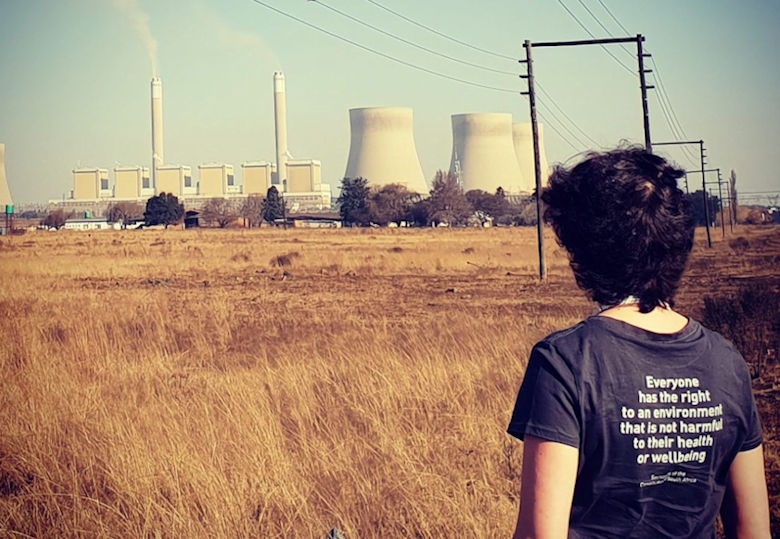
Photo: CER
29 April 2020 - Presenting shocking new expert findings on the health effects of the ongoing violations by Eskom’s Kendal Power Station to the Environment Minister, environmental justice organisations groundWork, Earthlife Africa, and the Vukani Environmental Movement have asked her to take immediate action to stop the toxic pollution from Kendal.
Kendal power station, near the N12 highway, nestled between Johannesburg and eMalahleni, is located within the Highveld Priority Area – declared as such by government in 2007 due to the high levels of air pollution and resultant dangerous health impacts.
World Earth Day - 22 April 2020

Coronavirus Resource Center

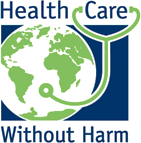 21 April 2020 - The coronavirus pandemic puts an extraordinary and unprecedented burden on health systems, organizations, and professionals. Never before have we faced a global crisis of this magnitude, one that challenges every country’s capacity to deliver health care services.
21 April 2020 - The coronavirus pandemic puts an extraordinary and unprecedented burden on health systems, organizations, and professionals. Never before have we faced a global crisis of this magnitude, one that challenges every country’s capacity to deliver health care services.
groundWork partner, Health Care Without Harm, has developed a webpage as a resource center for its partners around the world, for members of its Global Green and Healthy Hospitals Network, and for the broader community engaged at the intersection of environment, climate change and health.
You can visit the HCWH resource page by clicking here, or you can download a copy of the resources here.
Pandemic Highlights Society's Historical Debt to Waste Pickers – It's Time To Make It Up To Them

20 April 2020 - groundWork partner GAIA - a worldwide alliance of more than 800 grassroots groups, non-governmental organizations, and individuals in over 90 countries - has drawn attention to the plight of wastepickers in the time of Covid-19.
The COVID-19 pandemic has had a profound impact on the way we handle our waste, bringing with it a host of environmental, social and cultural challenges. For millions of people who make a living in the informal sector, isolation measures that guarantee their safety pose a dramatic threat to their livelihoods. People in the informal waste sector–those who do the critical yet thankless role of collecting and sorting our waste and recyclables without formal recognition and protections from their municipalities– are now facing a grave threat. 15 million informal waste workers and their families risk losing their livelihood due to Covid-19.
Environment Minister orders the disclosure of big polluters' climate information, CER announces.
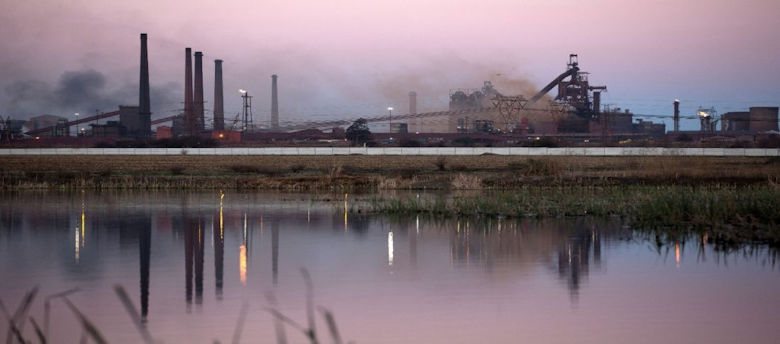
ArcelorMittal South Africa's Vanderbijlpark plant Image: James Oatway
09 April 2020 - The Minister of Environment, Forestry and Fisheries has upheld the appeal lodged by the Centre for Environmental Rights (CER) against the Department of Environment, Forestry and Fisheries' (DEFF) 2019 refusal to disclose key greenhouse gas (GHG) emission data and GHG emissions reduction plans for 16 heavy polluters.
In so doing, Minister Creecy has ordered DEFF to disclose GHG data of some of South Africa's highest GHG emitters, including Eskom, Sasol, ArcelorMittal, PPC, Exxaro, South32, Glencore, Seriti, SAPPI and Anglo American.
The Water Crisis in a Time of the COVID-19 Crisis - Women of Somkhele and civil society groups call on government to uphold promises and to provide water, in the time of the COVID-19 threat.
08 April 2020 - The women of Somkhele in KwaZulu-Natal are in a desperate and dire state without basic water supply during the COVID-19 pandemic and they, along with supporting civil society groups, are desperately calling on government to fulfil their promises to provide them with water.
The Somkhele community has already been facing severe and often catastrophic water scarcity, created by the combined effects of coal mining activities and droughts. Now, with the onset of the COVID-19 pandemic, these communities are facing a major crisis.
For the past week – the second of South Africa’s national lockdown – communities in the cluster of villages that make up Somkhele have had NO water. Not even the local clinic has access to water. Most households cannot afford to request water tankers, and some do not own JoJo tanks – a common method of storing water. Since the spread of COVID-19, Somkhele women are concerned that they will not be able to protect themselves and their families from the pandemic because they have no access to water.
Amidst the COVID-19 pandemic, government locks SA into deadly air pollution
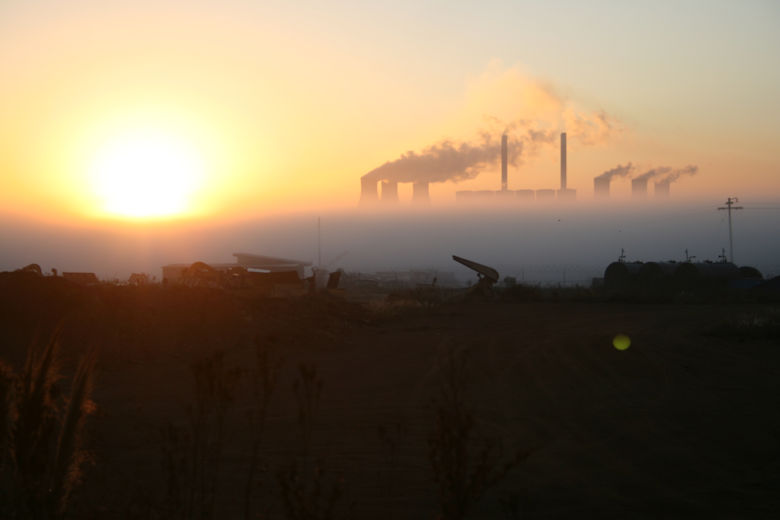
Photo: groundWork, Megan Lewis
31st March 2020 - With South Africa under a three week coronavirus lockdown, the Minister of Environment, Forestry and Fisheries has gazetted sulphur dioxide (S02) air pollution standards (called minimum emission standards, or MES) that are twice as weak as the previous standards.
Instead of Eskom, Sasol, and other facilities with coal boilers, having to meet the original SO2 standard of 500 mg/Nm3, they will now only be required to comply with MES doubly as weak (1000 mg/Nm3). The new limits apply either by tomorrow - 01 April 2020, or by the delayed dates that these companies have already been given by the National Air Quality Officer.
Research presented by the Life After Coal Campaign to the Minister and the Department has shown that 3,300 premature deaths would be caused by doubling the SO2 standard just for Eskom’s coal-fired power stations, as a result of increased risk of lower respiratory infections, increased risk of stroke, and increased risk of death from diabetes.
The weakening of the standard makes South Africa’s 2020 SO2 standard – which exists to protect people’s health and human rights – about 28 times more lax than in China, and 10 times weaker than India’s.
Statement from groundWork on its response to the Covid19 crisis
20 March 2020 - We are very mindful of the escalation of the Coronavirus (or COVID-19) pandemic. We need to take extraordinary measures in order to protect our staff and families, especially in consideration that our public transport and fragile healthcare system put our vulnerable communities in particular at risk. We are working closely with our healthcare partners though our GGHH campaign to make their systems more robust and to meet the most pressing of our environmental health challenges.
As with the climate crisis, the coronavirus marks out the connections and disconnections of our profoundly unequal society. It arrived in South Africa with middle class travellers but it will not be confined to the richer classes. Around 60% of South Africans are poor, according to official statistics, and they carry a very high burden of disease starting with malnutrition, HIV and TB. People's health is also compromised by high levels of pollution in the environmental sacrifice zones where our electricity is generated, our fuel is refined and minerals are mined and smelted. And while the richer minority have access to high quality health care, poor people do not. They rely on a public health system that is weakest where the need is greatest. Ironically, more government money goes into the private health system that serves the minority than into the public health system that has been subject to austerity budgeting for over two decades.
The coronavirus has disrupted profoundly interconnected and fragile global systems. However, this gives us an opportunity to make our world more equitable and to test our just transition to a society with decent jobs for all, universal healthcare, and energy systems that benefit people and the biosphere. We have to change systems that place profit over health and wellbeing. We have to recognize and address the political, social and economic factors that govern how health or illnesses moves through our communities. For example, many people living in informal settlements have no access to running water, making frequent hand washing very difficult, and crowded living conditions make social distancing almost impossible.
CER admitted as amicus curiae in appeal of troubling judgement against mining-affected community
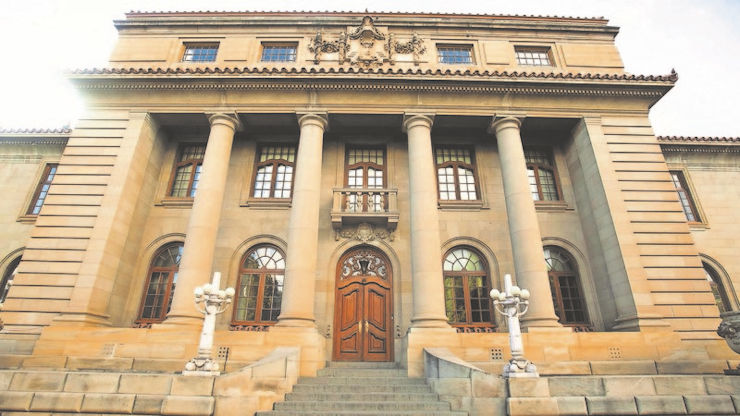
Supreme Court of Appeal building. Photo: CER.
19 MARCH 2020 - On 13 February 2020 the Supreme Court of Appeal (SCA) admitted the Centre for Environmental Rights as an amicus curiae (friend of the court) in an appeal by the Global Environment Trust and Others against a 2018 judgement of the Pietermaritzburg High Court. In that judgment now under appeal, the court had refused to grant an interdict application brought by the Applicants against Tendele Coal Mining (Pty) Ltd and had ordered public interest litigants to pay the legal costs of the coal mining company.
The CER intervened in the matter because of its concerns that the judgment opened the door for mining companies to operate illegally. The CER is also concerned that the negative costs order against public interest litigants would discourage communities from approaching the courts to defend their constitutional rights through the fear of being debilitated by having to pay the legal costs of industry and the State
SAWPA MEDIA STATEMENT
The South African Waste Pickers Association is calling all waste pickers, those gathering recyclable materials within the waste stream - on landfills, streets, illegal dump-sites and in communities to take care of their health in this difficult time.
It is a fact that once all the items associated with the Covid-19 – sanitiser containers, toilet papers, masks, etc. - have been used, waste pickers are the ones who will be at the receiving end to sort and separate from other waste products.
SAWPA calls upon our governments (all spheres), private sector, civil society organizations to assist, support, fund and work holistically with waste pickers during this time and make it easier for waste pickers to have access to sanitizers.
SAWPA calls upon our local governments to build material recovery facilities in every municipality, run and operated by waste pickers. It also calls upon the citizens of this country to unite in managing their waste from the source and start embracing the concept of Zero Waste.
groundWork’s 2020 environmental justice school kicks off
15th March 2020 - Activists from several community based environmental justice organisations are gathering at Valley Trust near Durban for three weeks. From the 15th March to the 4th April.
This is groundWork’s sixth Environmental Justice School which is drawing twenty two activists from as far afield as Sekukuneland, the Karoo, the Highveld Mpumalanga, south Durban among other spaces. In the past 5 years that the school has been running, 96 students from 7 countries have participated.
Ode to Joy
 13 March 2020 - In the early hours of Wednesday, 11th March, Joy Kistnasamy, groundWork's chairperson and friend to all, passed away peacefully in her sleep. Joy, as her name pronounced, was a happy person. Even in times of stress and pain, she was always upbeat, exuding a positivity that was infectious.
13 March 2020 - In the early hours of Wednesday, 11th March, Joy Kistnasamy, groundWork's chairperson and friend to all, passed away peacefully in her sleep. Joy, as her name pronounced, was a happy person. Even in times of stress and pain, she was always upbeat, exuding a positivity that was infectious.
In groundWork, Joy was a staunch supporter of our environmental justice mission, and also a friend and confidant to us. She was our chairperson for the past decade and she has been with us during a period of growth, a period we never thought possible when we started groundWork in 1999.
Joy was always keen to draw groundWork staff into her work, from our annual trek to DUT to deliver our environmental justice and health lecture, to attempting to introduce Zero Waste into DUT and bringing our environmental health work into the faculty. She was always trying to cook up something. She was adamant that students had critical thought and needed to experience environmentalism through the lens of environmental justice, through the work of the Alliance and groundWork.
Read the full eulogy for Joy Kistnasamy by groundWork Director Bobby Peek here.
Standard Bank’s coal policy fails to provide meaningful leadership on the climate crisis
12 March 2020 - Following a resolution tabled by its own shareholders in May 2019, Standard Bank last week released a policy on funding of thermal coal mining. This was an opportunity for Standard Bank to demonstrate its commitment and contribution to combatting climate change and enabling a just transition to a low-carbon economy.
Standard Bank has missed that opportunity by publishing a policy that is weak and inadequate: it makes no commitment to ending funding for coal mining. Its policy contradicts its claimed vision “to be the leading financial services organisation in, for and across Africa”.
Any meaningful effort from financial services corporations to address the severe risks posed by climate change to South Africa and the global economy, must cease lending to both coal-fired power projects and coal mining. Standard Bank’s respective policies on financing thermal coal mining and coal-fired power both demonstrate a lack of leadership on efforts to address the climate crisis.
Department of Mineral Resources and Energy a no-show
12 March 2020 - Communities from Witbank, Phola, Middleburg, Wonderfontein, Ermelo, and Springs are protesting at the DMRE (Department of Mineral Resources, and Energy) regional office in Witbank. This comes after the department failed to show up for a public meeting organized by the department. The purpose of the meeting was to discuss the amendment of the MPRDA (Minerals Petroleum Resources Development Act) and draft guidelines on resettlement.
The communities are demanding that DMRE treats them with respect in dealing with issues facing fence-line communities. They are also demanding to be reimbursed for the resources wasted travelling to Witbank. Reports from the ground indicate that the protesting communities are now inside the DMRE offices in Witbank.
Fair, Meaningful and Sustainable Change - A Just Transition Report
 05 March 2020 - groundWork, Friends of Earth South Africa together with its Life After Coal partners the Centre for Environmental Rights and EarthLife Africa JHB launch their 2019 report titled Down to Zero: The politics of just transition.
05 March 2020 - groundWork, Friends of Earth South Africa together with its Life After Coal partners the Centre for Environmental Rights and EarthLife Africa JHB launch their 2019 report titled Down to Zero: The politics of just transition.
A just transition has become a central talking point from the United Nations to the streets of Mpumalanga, where coal defines life. The Down to Zero report is documents the situation as it stands and calls for system change.
The report highlights the detrimental effects of capitalism’s obsession with fossil fuel. A just transition means a break with, and within, the present order by creating a shared vision of a different future. The report speaks to the urgent need to respond to climate change, create a truly democratic and participatory order, and share our work and the wealth of the land.
Another nail in the coffin for doomed Khanyisa private coal plant project
18 February 2020 - The expiry of one of its key operational licences is the latest major setback for developer ACWA Power’s proposed Khanyisa coal-fired power station in the Mpumalanga Highveld.
This private coal power project, like the other projects conceived as part of the now outdated 2014 Coal Baseload Independent Power Producer Procurement Programme (“the Coal IPP Programme”), has been plagued by obstacles over the past few years. These include the withdrawal of funding by a number of commercial banks under pressure to stop funding coal power, and a barrage of legal challenges by civil society organisations of the multiple authorisations required for these projects.
In one of these legal challenges, environmental justice group groundWork, represented by the Centre for Environmental Rights, has challenged Khanyisa’s environmental authorisation in the Pretoria High Court. groundWork is asking the court to set aside the then Minister of Environmental Affairs’ decision to issue ACWA with an environmental authorisation without conducting a legally-required climate change impact assessment.
SONA 2020: Progress on clean energy, but still talk of dirty coal
14 February 2020 - The Life After Coal campaign welcomes a number of announcements made by President Cyril Ramaphosa in the State of the Nation Address last night on lifting barriers to new generation of clean, more affordable electricity from renewable energy.
We also welcome the acknowledgement of the existential threat of climate change, and the President’s commitment not to leave behind any African child in the transition to a “low-carbon, climate resilient and sustainable society”.
We welcome the announcement that municipalities in good standing will be allowed to procure electricity from renewable energy. However, we see no commitments to local, social and community-owned renewable energy generation. We call for concrete plans to support such local capacity for “people’s power”– essential for a just transition.
We are dismayed at the President’s reference to any new generation from coal. Here are all the reasons why coal is too expensive, kills people and destroys the environment - Environmental justice organisations condemn SA’s plans for more coal generated electricity.
We are also disappointed that no mention was made in the President’s address of the toxic air pollution by the ongoing and flagrant violations of Eskom’s dirty coal plants with air pollution laws, which kills and impairs the health of thousands every year, including children. These are ongoing violations of people’s Constitutional rights which require an urgent response. Read more about the court case brought against government here - Environmental groups take government to High Court over violation of Constitutional right to clean air.
Contacts:
Lerato Letebele Balendran lbalendran@cer.org.za or
Tsepang Molefe, media@groundwork.org.za - 074 405 1257
NGOs challenge Eskom's latest application to escape compliance with air pollution laws

September 23, 2016. Kriel Power Station. Coal mining and power stations in Mpumalanga. Picture: JAMES OATWAY
7 FEBRUARY 2020 - Eskom has for a 5th time applied to escape compliance with South Africa's air pollution laws.
The Life After Coal campaign, consisting of groundWork, Earthlife Africa and the Centre for Environmental Rights, has filed comprehensive submissions opposing Eskom's latest application to delay or completely avoid meeting the April 2020 pollution limits for its coal power plants.
Despite being the biggest polluter in South Africa and already receiving widespread postponements of compliance deadlines, Eskom is still attempting to delay or completely avoid meeting the April 2020 pollution limits in the Minimum Emission Standards (MES) for 14 of its 15 dirty and deadly coal-fired power stations. Eskom's various applications across its fleet of power stations blatantly undermine the MES, which exist to protect people's health and wellbeing, social and economic development, and the environment.
Africa Energy Leaders Summit
07 February 2020 - From 28th to 29th January 2020, groundWork attended the MELCA-Ethiopia, Oil Change International, Health of Mother Earth Foundation, Oxfam, and Power Shift Africa convening of the Africa Energy Leaders Summit at the Ambassador Hotel in Addis Ababa, Ethiopia. At the Summit, civil society leaders – representing twenty-seven organizations, networks and community resistance groups from Africa and around the world – deliberated on issues including fossil fuels dependence, climate change, energy access and the just transition.
This is a call to interested organizations, networks, and community resistance groups to please visit the Communiqué of the 2020 Africa Energy Leaders Summit here, where you can download the Communiqué and add your endorsement of the document.
Tshwane waste pickers gearing up to work with the City.
29 January 2020 - The South African Waste Pickers Association is hosting the Tshwane waste pickers mass meeting at the Atteridgeville Community Hall (corner Ramakgopa and Hlahla Streets, Atteridgeville, Pretoria). The main purpose of the meeting is to report back to the waste pickers about negotiations that started in June 2019 between the council and the waste pickers of the City of Tshwane. The organisation will also utilise the gathering as part of their national roadshow to register and officially document all the waste pickers who are interested to join the movement. A 2020 strategy will also be developed on what needs to be done to strengthen the waste pickers organisation in Tshwane.


